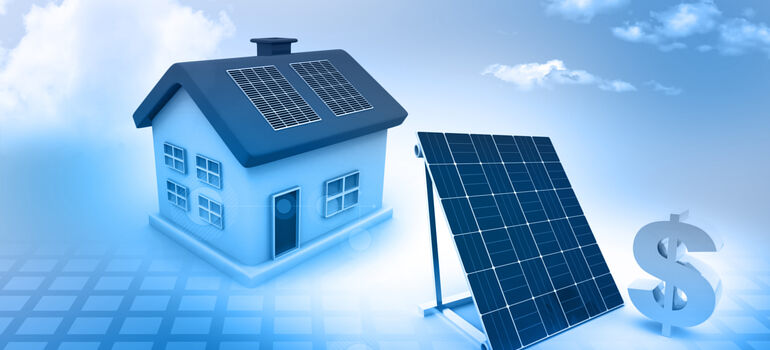Living off the grid, a lot of people ask me if it is really worth the expense and trouble when you can just hook up to the grid and not worry about it. If your are considering going off grid, read this article first! So, is off grid solar really worth it?
While the cost of off grid solar is competitive with grid power, you do have to pay up front for the entire system equivalent to more than a decades worth of power. However, there are significant benefits in terms of freedom, security, sustainability as well as unexpected cost savings to be found with off grid solar.
Here are the four reasons why off grid solar is worth it. And, the secret to making off grid solar cost effective.
Cost of Off Grid Solar is On Par with On Grid Power
Usually when people talk about solar power being “worth it,” they are talking price. While the total cost of a solar installation varies from state to state — mostly to the amount of sunshine they get — solar energy is cheaper than grid energy in many states.
However, these statistics can be a little misleading when it comes to off grid power, because these prices don’t account for energy storage costs and power lost during the conversion between DC and AC, which is required to run standard household appliances from batteries.
In my previous article 10 Cool Facts You Didn’t Know About Solar I did some analysis of the actual cost of off grid power for a typical small scale installation —
The Math. According to data from EIA, the average residential power price in the USA in July this year was cents 13.26/kWh. Although, in some places it was as high as 28.87 cents.
According the National Renewable Energy Laboratory, most areas of the United States average 5Wh per watt of panel, per day over the course of a year. And, assuming that a solar system lasts 20 years, that makes the total cost of solar power about 10 cents per kWh.
The bottom line is that off grid solar power is highly competitive with grid power over the life of the system.
However, the biggest negative of off grid solar system is that you have to pay the entire price of the system up front, rather than monthly as you use it.
Ready to price your off grid system? Check out these two complete guides to off grid solar —
Off Grid Solar Provides Greater Energy Security
In my opinion, one of the biggest benefits of off grid solar is the fact that you don’t have to depend on a utility for the power you need to survive.
With PG&E cutting power to more than 1 million people this summer, we can no longer assume that power will outages will rare and short. Allowing faceless mega-corporations to have the ability to switch off your power at a moment’s notice isn’t just a safe proposition.
Likewise, foreign adversaries in increasingly eyeing the United States’ power grid as a potential point of attack. In 2018, the DHS announced that the Russian government is targeting energy infrastructure, and not long before the western US energy grid was successfully hacked by anonymous attackers who may have been related to China.
Only an off grid energy system can protect from devastating long term power loss.
While there are several viable types of off grid power systems including —
- Solar / Photovoltaics
- Micro-Hydro
- Wind
Solar is the only widely available energy source. Almost every part of the Unites States has viable solar energy resources. So long as you property has a clear view of the southern sky, the solar is probably an option.
While micro-hydro is a good option, only few properties have access to a stream or river with sufficient flow and downward slope to make water power a useful alternative, as well as the legal right to use water for that purpose. If you are lucky enough to have such access, check out my article on building your own hydroelectric power station —
Wind power is also sporadic at best. Unless you live in an area that is windy on a daily basis, low elevation wind power installations available for family scale off grid are probably not reliable enough to rely upon as a primary energy source.
However, wind is an interesting option as a companion to solar. Check out my article on wind charge controllers to see how this can be done —
Greater Freedom Independence through Off Grid Solar
Another big plus for off grid solar is the freedom you get from cutting the cord.
Boondockers and the “van life” community have already realized that solar is great when you want to be able to move at a moment’s notice. Small scale solar power is both portable and effective almost no matter where you go.
For the more stationary homesteaders and permaculturists, off grid power gives you more freedom in your choice of location. Having the ability to live in anywhere you like provides the following benefits —
- Land without power access can be much less expensive
- You can live far away from neighbors
- Islands, fly in, or boat in remote properties are possible
Ultimately, going off the grid can save you a lot of money, both in initial land cost but also ongoing property taxes, which are based on the value of the property.
Another thing to think about is that going off grid frees you from the need to allow utility workers on your land without notice, or mandatory installation of wireless smart meters on your property.
With off grid solar a fundamental right of American Citizen, we should all make an effort to exercise that right and prevent excess concentration of authority in centralized corporate interests.
Up Front Costs of Off Grid Solar Lead to Greater Efficiency
One of the biggest drawbacks of off grid solar power can also be one of its greatest strengths. This is what most people get wrong about off grid solar.
The biggest mistake people make is that they try to go off grid is they try to replace grid power watt for watt. It is much more efficient to consider changing out appliances and modifying your usage habits, rather than building up your system to the level of “grid replacement.”
Luckily, the fact that we have to pay for our off grid systems cost upfront helps us achieve this goal. Instead of spending money on more panels and batteries, if we divert some funds to buying more efficient DC appliances, we can usually come out ahead in terms of price.
Learn how to design an efficient and cost effective off grid system here —
For those who are environmentally conscious, reducing your power consumption helps reduce consumption of natural resources, even with solar systems. Additionally, it allows you to invest in long living non-toxic batteries like the following —
Related Questions
Can you live off grid with solar panels?
Yes. Solar panels combined with appropriate electronics and battery storage are capable of supplying completely off the grid. Installing an independent solar power system is legal in the Unites States, and generally allowed throughout the world.
What are the 2 main disadvantages of solar energy?
The two biggest disadvantages of solar energy are that energy costs must be paid up front — rather than monthly — and that solar power is highly variable. Since power output varies through the day and throughout the year, expensive energy storage solutions are required to level out supply and demand.


